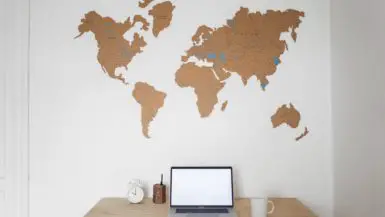So your routine is giving you an existential crisis: you get back from work, take off your shoes and melt on the couch like knackered jello. This 9-5 job, this house, this city just won’t do anymore, and you suddenly find yourself suffering from a severe case of wanderlust. Like for any other hypochondriac in the 21st century, the cure to your unfulfilling life rests in the hands of Google research. And here is where Digital Nomadism enters the chat.
Traveling while working sounds like a dream come true; but before filing those resignation papers, you might want to make sure that Digital Nomadism is for you. So here’s some things to consider to avoid embarking on a journey like a headless chicken or suffering early burnout.
No, it’s not about Instagram feeds and coconut bowls
With tons of modalities and sub-categories, the definition of Digital Nomadism appears way too wide to be grasped in just a few key points; however, some misconceptions just beg to be demystified. Of course, the idea of turning into a fearless globetrotter is enticing; but Digital Nomadism is way more than just traveling. Digital Nomadism is a lifestyle, and like any other lifestyle, it demands commitment and sacrifice. While no one is going to deny the exciting advantages of being a nomad, keep in mind that you’re transitioning from one way of life to a different, maybe more intriguing one – but a life that needs balance and structure nonetheless. Having said that, stop scrolling through those Instagram pictures of laptops on the beach and start researching into all the implications that a nomad life may bring. True, more than a few digital nomads make of their life choice a tale to tell, and posting about their days becomes part of their job. And you might shrug your shoulders to that, but catering audience through the creation of content requires real competence! Other than that, most of the digital nomads are entrepreneurs and resourceful souls offering specific sets of skills to clients all over the world.

This is not an attempt to discourage you, and no one should ever try to demoralize you: if you’re here because you decided to look for a way to improve your life quality, that alone is a hugely brave step and you should embrace this spirit of yours. But as the say goes, you can never be too prepared. Getting mentally and emotionally aware of what you’re stepping into is always a move in the right direction when it comes to making big changes; which brings us to the next point.
Digital Nomadism can help with your anxiety!..or not
Mental health is an extremely complex and broad topic, hence here we will only tackle anxiety and stress-related matters in general terms. Your longing for a nomad life may be the consequence of a toxic environment that provides you with nothing but big stacks of stress. Surely it was easier to be naive kids and build a blanket fort to declare open war to the outside world. But now this trick won’t do with all those bills to pay and responsibilities to take. If you feel like you’re strikingly bad at managing stress and anxiety, take the time to consider how a nomad life could affect your coping mechanisms. The transition into this new lifestyle could finally give you a way out of a constricting job and allow you to invest in something that better responds to your preferences and skills. But as we mentioned before, Digital Nomadism is a way of life, so your work won’t disappear under a pile of sand or behind a beautiful sunset – not forever at least. With all the pros that it guarantees, a career on the road can become quite exhausting. Packing, unpacking, building a network, making friends but suffering loneliness as well, feeling homesick, meeting deadlines but also exploring everything a country can give you, losing jobs and landing new ones, generating enough money to move again. These are only a few of the activities and emotional situations that you’ll probably experience as a digital nomad – always accordingly to your position and plans. There’s a whole world of emotions and psyche inside you and you should always be listening to your body and mind. The greatest lifestyle you can adopt is the one that allows you to take care of yourself and helps you achieve the best mental state possible. Therefore, if you’re already struggling with stress and anxiety – if simply reading all of this is making you panic!-, take a deep breath and weigh your triggers. And if you try it out and realize it’s more of a burden than a liberation, remember not to force yourself onto a specific path just because it’s commonly considered the ideal one.
Of course, when it comes to psyche and emotions it’s all very subjective, and here we’re all about looking at the glass both half full/ half empty. So yes, Digital Nomadism can be stressful; but can also be extremely beneficial. As Joey Tribbiani would say, ”you have a fear of heights? you go to the top of the building! You’re afraid of bugs?…get a bug!”. The same logic applies here: facing instability in the diverse context determined by the nomad life could actually provide you with new, extraordinary ways to deal with anxiety and stress. The inevitable adventures and adversities that you’ll be exposed to have the power to make you grow more aware of your inner self and your personal limits. By discovering new ways of living life, you’ll definitely understand more of yourself: this may allow you to gain further control and recognize the best approach to endorse in the face of hardship.
N.B. If you suffer from serious mental conditions, please know that Digital Nomadism should never be considered a therapeutic route of choice to fix any mental health issues. While Digital Nomadism can help, it is not a solution to any difficulties requiring medical care.
You can’t escape routine – and you probably shouldn’t!

We’ve all been there: that damn mundanity just feels so tight, a bit of a straightjacket. Digital Nomadism can trick people into believing that worldwide adventures equal a breakout from any kind of routine. However, besides the misinterpretations revolving nomadism, the underlying problem is the negative connotation that gets attached to the concept of routine. Upon hearing that word, most get hit by these depressing images of a person pushing through the day like a zombie on autopilot. Wake up early, commute to your job, eat, crush, repeat; doesn’t sound like much fun huh? So let’s first work on shifting your perspective: a routine is not a cluster of draining actions; it’s about rituals, habits, structures, aimed at easing your life. As a digital nomad, you’ll need a method to keep yourself grounded throughout that hectic life. We’re not just talking about organizing your time between work and exploration: you will benefit from any little ritual devoted to personal care. Be it taking a walk, meditating, delving into a hobby, having a cup of tea or dedicating your morning to a skincare regimen, you’ll still want to put some things into tiny boxes while living a life outside of the box. It all comes down to maintaining a sense of self, creating a safety net of some kind: your goal should be to achieve balance and preserve a bit of control on your life. This is especially true for those aspiring nomads already struggling with anxiety and stress: a routine, whichever it may be, will bring a bit of order in your mind and help you prevent burnout. Be aware that there is no ideal routine for a digital nomad, as everyone proceeds at a different pace in this type of life. Hence, bid your goodbyes to Wikihow and start crafting your own personal routine.
It’s only you – and most times, it’s all on you

Hundreds of miles separate you from your loved ones and the thought of face timing with your dog for the next few years makes you ache. There’s no real technique to fight homesickness; keeping in contact with family and friends becomes extremely hard when you’re in a totally different time zone. As a digital nomad, you’re bound to meet tons of extraordinary people along the way, just as much as they’re bound to be passersby in your life. Homesickness does not simply refer to the distress caused by the separation from loved people and objects. If you spent a good chunk of your life building yourself around a certain lifestyle, abandoning it may leave you with a sense of disorientation. Fleeing your home and feeling lost is a combo deal that your mind will easily feel like buying in; and just like that, your sweet night sleep is ruined. It’s solely your responsibility to make this lifestyle work out; and while this statement is true of any way of life, your parting from anyone and anything familiar will render this harder. In light of this, you’ll need to adopt a few strategies not to let the occasional loneliness and turmoil overwhelm you. One of these is the above-mentioned concept of routine: you’ll spend quite some time with yourself alone, so you’ll have to learn to listen to your mind and body and respond accordingly. Furthermore, when moving from place to place, make sure to check out if there’s any digital community active in the city, and make an effort to engage with them nomads. Sure, they’ll be on the first plane before even starting to share pictures of their pets and scandalous stories; but they’re probably going through the same emotions and feelings you’re experiencing. Sharing the burden with someone who’s able to relate can be of extreme help in situations like this.
MORE: How to become a digital nomadDigital Nomadism is an incredible choice of life, one that enriches your soul and expands your connection with the world and the entire humanity. It can be scary to take a leap into it: you’re not just taking a look around you, but inside you as well. And if the geographical coordinates are easy to follow, the ones to your inner balance are harder to trace. But remember, even Linus dropped his security blanket at some point, shouting his brave yawp to the world: “fear not!”.







This a very interesting and helpful article, very well written too